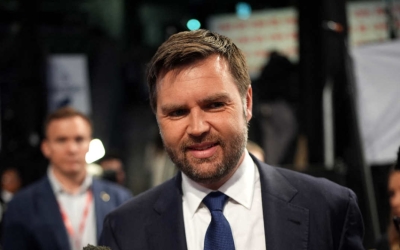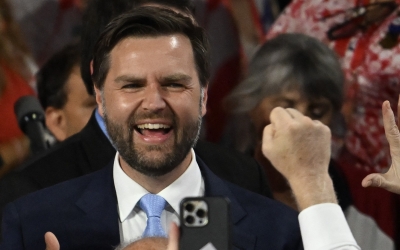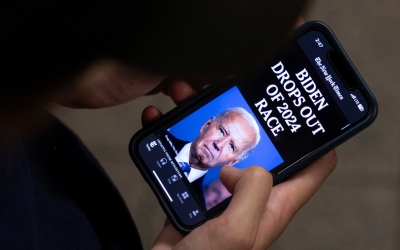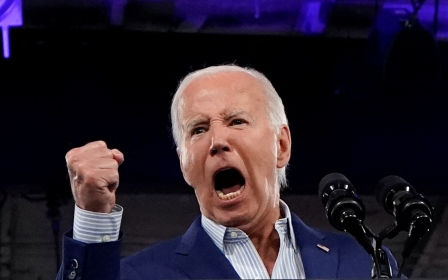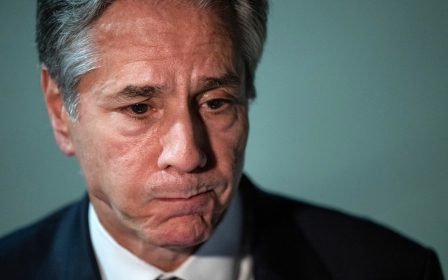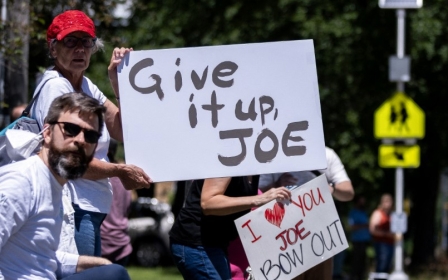JD Vance could be president in four years. This is bad news for the Middle East
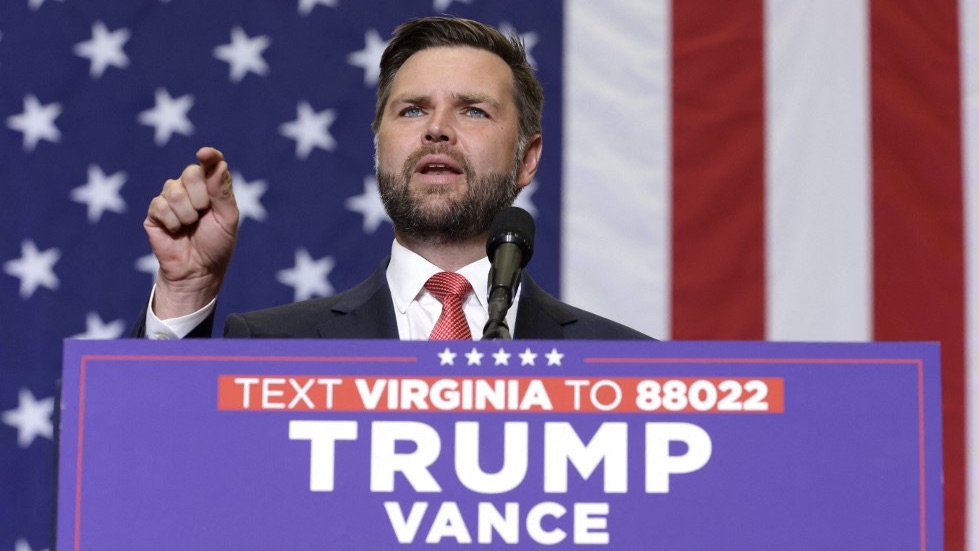
In the space of just over a week, three important events have taken place in the Global West.
Donald Trump escaped an assassination attempt, Ursula von der Leyen was reconfirmed as president of the European Commission and President Joe Biden dropped out of the race for the US presidential election.
In other words, there was a failed attempt to kill Trump but the only thing that died was Biden’s political ambition. Von der Leyen’s reconfirmation is less relevant - she is tied to Washington’s orders, no matter who is in charge there.
The news that deserves to be commented on more is the choice of Ohio Senator JD Vance as Trump’s running mate for November's election.
Vance, 39, symbolises the American dream. He is a white American from the poor “Rust Belt” devastated by globalisation.
New MEE newsletter: Jerusalem Dispatch
Sign up to get the latest insights and analysis on Israel-Palestine, alongside Turkey Unpacked and other MEE newsletters
He never knew his father and grew up with a drug-addicted mother. After 11 September 2001, he enlisted in the US Marine Corps to fight in Iraq. Later, he went to Yale Law School, and then into venture capital in California.
In 2022, he was elected to the US Senate for Ohio for the Republican party. The 2016 memoir of his youth, Hillbilly Elegy, became a best-seller and is considered one of the best explanations for Trump’s electoral victory in 2016.
Apex of US power
Vance has had a meteoric career. Now he may be at the apex of American power for the next few years at least, first as vice president and then, possibly, as president. In four years' time, Trump will most likely be gone, and his deputy has already been designated as the next torchbearer of the Maga movement.
His personal history, after all, makes him more palatable to the millions of the “deplorables” (copyright Hillary Clinton) - who are the backbone of the movement - than Trump, the wealthy scion of a New York Upper East Side family.
Vance might be a model for the “deplorables”, but he once declared himself as a no-Trump Republican, and has compared the former president to Hitler.
Nonetheless, his views and beliefs matter, although the hope is that he will be less influential than Dick Cheney was for George W Bush.
He has already outlined his thoughts on the top three geopolitical conflicts. But he is still young, so another hope is that realpolitik will help him to change or amend his views.
Vance’s opinion about the war in Ukraine sounds like a death knell for significant and protracted US engagement in the conflict against Russia, as well as for the US maintaining its leading role within Nato.
He seems to believe that the Ukraine conflict is a European affair that should be dealt with by Europeans through their increased military spending. In other words, what’s going on in an eastern European country is not worth a third world war with Russia.
If some Europeans believe it is, they can go it alone. This is America First prevailing over Make America Great Again.
Fervent Zionist
It might be a coincidence, but in the last week or so, Ukrainian President Volodymyr Zelensky's statements concerning possible dialogue with Russia have significantly changed. On 15 July, Zelensky said that Russia should be invited to the next peace conference on Ukraine, scheduled for November. (Many wondered why Moscow was not invited to the one held in Switzerland last month.)
As for Europe largely replacing the US in supporting Ukraine, and preparing to fight a larger war with Russia without Washington's help, the recent decision by Germany to halve its 2025 financial commitment to Ukraine due to budget constraints is noteworthy.
To put it simply, the bombastic Nato summit earlier this month might look quite different in a few months' time.
If Vance seems innovative regarding Ukraine, there is little hope that he might be on the Middle East too.
He is a fervent Zionist, clinched to Aipac, and a super-hawk on Israel-Palestine and Iran.
In other words, the die-hard, mistaken, self-harming and counterproductive policies that the US has been following in the region over recent decades will probably be continued by a new Trump administration and, eventually, by a Vance one.
The expectation is that a new Trump White House would renew Israel's licence to indiscriminately kill Palestinians and even remove the tiny constraints and words of warning that the Biden administration had feebly dared to pronounce.
All the indications show that Vance would do the same.
Whether Saudi Arabia, in the current circumstances, is reckless enough to normalise its diplomatic relations with Israel while the International Court of Justice is assessing whether Israel is guilty of genocide - and it has already ruled that it is blatantly violating international law with its decades-old occupation of Palestinian lands - remains to be seen.
End to US exceptionalism?
In this context, nobody should underestimate Secretary of State Antony Blinken’s recent remarks about Iran now being one to two weeks away from being able to produce a nuclear weapon.
On this issue, it seems that a possibly outgoing Biden or Harris administration - depending on whether Biden resigns before the end of his mandate - is paving the way for a possible Trump-Vance one.
And drop any hope, too, that Vance would be innovative regarding China.
He has said that the reason he wants to disengage from Europe is because he wants to focus on containing China, although his views on the issue are far more articulate than those of the average Washington pundit.
Vance knows that China’s rise is not due to cheating and unfair practices, as Washington’s official narrative claims, but because of US corporate greed, which outsourced production to China to cut labour costs and which created the millions of left-behinds among whom he grew up.
Vance knows that China’s rise is not due to unfair practices, as Washington’s official narrative claims, but because of US corporate greed, which outsourced production to China to cut labour costs
The crucial issue is how he will manage such realism.
There is always a residual possibility that both Vance and Trump might be more transactional than ideological and, above all, that their claimed commitment to bring peace, or at least avoiding major wars, might help them to finally see the world for what is and not as it should be according to US exceptionalism.
Vance in this sense might nurture the belief that the US should stop being the world's policeman when this is not a primary interest of the United States.
This would not represent a rebuttal of US exceptionalism, but it could be a beginning.
Vance could then become the first US politician in power in 100 years to give up the ideological view that has largely characterised American international politics in that period. Time will tell.
Big question marks
American history shows that US presidents are rarely capable of prevailing over the political establishment surrounding them, better known as the Blob or the new acronym known as the Micimatt (Military-Industrial-Congressional-Intelligence-Media-Academia-Think-Thank) complex.
Barack Obama prevailed over it in 2013 when he refused to commit to a US military intervention in Syria over the alleged use of chemical weapons by the Syrian government, opting wisely for an agreement managed by Russia, while Trump had to give up on his intention to withdraw American troops from the same country in 2019.
There are still big question marks over Trump’s and, potentially, Vance’s foreign policy, especially because of the former's complete unpredictability.
However, if their professed intention of not searching for new major wars is authentic, they will find a formidable obstacle in the Russophobe, Sinophobe and Zionist components of the Blob. If a clash occurs, it will be an epic one.
Drawing from previous experiences, it is probably better to be pessimistic.
Both will likely be ultimately bamboozled, or have their arms twisted, by the establishment.
Things would also depend on how clear a Trump victory in November is: in other words, if, in addition to the White House, he won both houses of Congress.
Whatever happens, the Trump-Vance ticket’s domestic and foreign agenda would be subject to the hard constraints of the deep polarity which characterise, and most probably will continue to characterise, US politics.
The views expressed in this article belong to the author and do not necessarily reflect the editorial policy of Middle East Eye.
Middle East Eye delivers independent and unrivalled coverage and analysis of the Middle East, North Africa and beyond. To learn more about republishing this content and the associated fees, please fill out this form. More about MEE can be found here.



